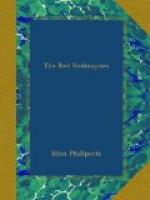Brandon then examined the ground immediately outside the kitchen door. It was rough and trampled with many feet of the workmen but gave no special imprints or other indications of the least value. For twenty yards he scrutinized every inch of the ground and presently found indications of a motor bicycle. It had stood here—ten yards from the bungalow—and the marks of the wheels and the rest lowered to support it were clear enough in the peat. He traced the impressions as the machine was wheeled away and observed that at one soft place they had pressed very deeply into the earth. The pattern of the tire was familiar to him, a Dunlop. Half an hour later one of the constables approached, saluted Mark, and made a statement.
“They’ve pulled down the wall, sir, and found nothing there; but Fulford, the mason, says that a sack is missing. It was a big sack, in the corner of the shed out there, and the cement that it contained is all poured out; but the sack has gone.”
The detective visited the spot and turned over the pile of cement, which revealed nothing. Then, having himself searched the workmen’s shed without discovering any clue, he strolled in the immediate neighbourhood of the bungalow and examined the adjacent entrance to the quarries. Not the least spark of light rewarded the search. He came back presently out of the rain which had now begun to fall steadily—but not before he had strolled as far as the fishing pools and seen clear marks of naked, adult feet on the sandy brink.
Inspector Halfyard, who had remained in the bungalow, joined him while he examined the other five chambers with close attention. In the apartment destined for a sitting-room, which faced out upon the great view to the southwest, Brendon found a cigar half smoked. It had evidently been flung down alight and had smouldered for some time, scorching the wooden floor before it went out. He found also the end of a broken, brown boot lace with a brass tag. The lace had evidently frayed away and probably had broken when being tied. But he attached not the least importance to either fragment. Nothing that he regarded as of value resulted from inspection of the remaining rooms and Brendon presently decided that he would return to Princetown. He showed Halfyard the footprints by the water and had them protected with a tarpaulin.
“Something tells me that this is a pretty simple business all the same,” he said. “We need waste no more time here, inspector—at any rate until we have got back to the telephone and heard the latest.”
“What’s your idea?”
“I should say we have to do with an unfortunate man who’s gone mad,” replied the detective; “and a madman doesn’t take long to find as a rule. I think it’s murder right enough and I believe we shall find that this soldier, who’s had shell shock, turned on Pendean and cut his throat, then, fondly hoping to hide the crime, got away with the body. Why I judge him to be mad is because




